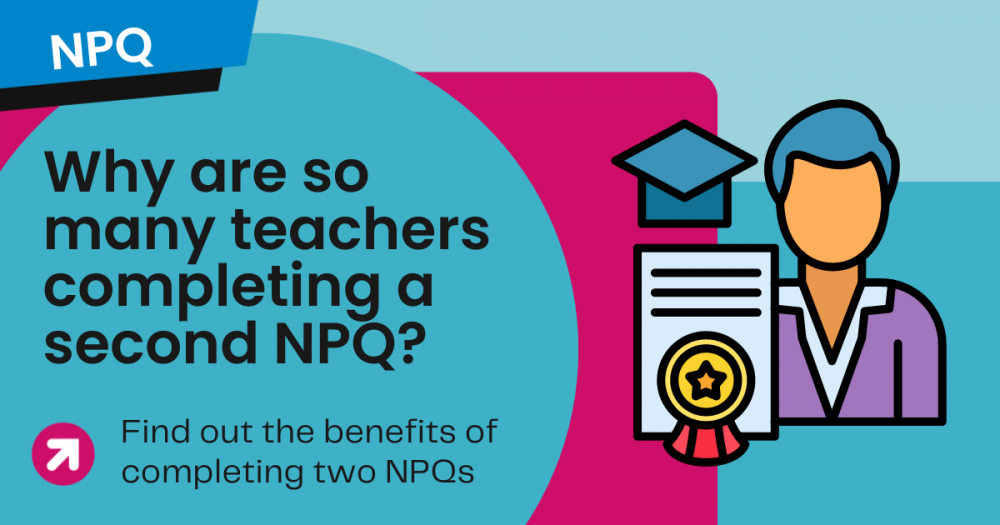Why are so many teachers completing a second (or third!) NPQ?

Why are so many teachers completing a second (or third!) NPQ?
The National Professional Qualifications (NPQs) are a suite of qualifications designed to support the professional development of teachers and school leaders in England. There are nine NPQs in total, covering a range of topics from teaching and learning to leadership and management.
In recent years, there has been a significant increase in the number of teachers completing a second NPQ. This is likely due to a number of factors, including:
- The desire to develop expertise in a particular area. The NPQs offer a range of specialisms, such as leading teaching, leading the development of other teachers and leading behaviour and culture. Teachers may choose to complete a second NPQ to develop their expertise in a particular area of interest or to prepare for a future leadership role.
- The recognition of the value of NPQs for career progression. The NPQs are highly regarded by schools and can help teachers to advance their careers. For example, some schools may require teachers to have a specific NPQ in order to be eligible for certain leadership roles.
- The DfE will fund further NPQs. In recognition of the importance of these qualifications, the DfE is happy to fund second and even third NPQs for teachers who have already received an NPQ scholarship.
How does completing a second NPQ improve teachers' teaching practice?
Completing a second NPQ can help teachers to improve their teaching practice in a number of ways. Firstly, it provides them with the opportunity to develop their knowledge and skills in a specific area. For example, a teacher who has completed the NPQ for Senior Leadership (NPQSL) might complement their newfound senior leadership expertise with knowledge and understanding of teacher training and CPD through the NPQ for Leading Teacher Development (NPQLTD).
Secondly, completing a second NPQ can help teachers to reflect on their own practice and to identify areas for improvement. The NPQ process involves teachers developing and implementing an improvement project, which gives them a chance to try out new ideas and to see what works best for their students.
Thirdly, completing a second NPQ can help teachers to build their confidence and to develop a more strategic approach to their teaching. The NPQ process requires teachers to think about their teaching in a more systematic way and to develop clear goals for their students.
How do multiple NPQs help schools and pupils?
Schools and pupils can benefit from teachers completing multiple NPQs in a number of ways. NPQs can help schools to improve the quality of teaching and learning. Teachers who have completed NPQs are more likely to be knowledgeable about effective teaching practices and to be able to implement these practices in the classroom.
NPQs can help schools to develop their future leaders. Teachers who have completed NPQs are more likely to be interested in taking on leadership roles within the school. This can help schools to create a pipeline of talented leaders who are well-prepared to take on senior roles in the future.
Schools can create a culture of professional development when a number of teachers have completed multiple NPQs. This is because multiple NPQs can help to create a positive atmosphere of learning and development within a school. Teachers who have completed NPQs are more likely to be open to new ideas and to be willing to share their knowledge and experience with others. This can lead to a more collaborative and supportive school environment, which can benefit all teachers and pupils.
Examples of how multiple NPQs have benefited schools and pupils
There are a number of examples of how multiple NPQs have benefited schools and pupils. For example, one school reported that the number of pupils achieving their expected grades in English and mathematics increased by 10% after a group of teachers completed the NPQ for Leading Teaching (NPQLT).
Another school reported that the number of pupils who were suspended from school decreased by 20% after a group of teachers completed the NPQ in Leading Behaviour and Culture (NPQLBC)
And yet another school reported that the number of teachers who applied for leadership roles within the school increased by 50% after a group of teachers completed NPQs,
Additional benefits of multiple NPQs
In addition to the benefits mentioned above, there are a number of other ways in which completing multiple NPQs can benefit teachers, schools, and pupils. For example:
- Teachers can develop a deeper understanding of the education system. The NPQs cover a wide range of topics, from teaching and learning to leadership and management. By completing multiple NPQs, teachers can develop a deeper understanding of how the education system works and how they can play a role in improving it.
- Teachers can become more well-rounded and adaptable. The NPQs offer a variety of specialisms, which means that teachers can develop their expertise in a number of different areas. This makes them more well-rounded and adaptable to the changing needs of the education system.
- Schools can create a culture of professional development. When a school has a number of teachers who have
Find out more
If you would like to know more about NPQs, get in touch with one of our friendly advisors using the details below:
Email: enquiries@bestpracticenet.co.uk
Tel: +44 (0) 117 920 9200 (8.30am-5.30pm, Mon-Fri)

